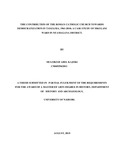| dc.description.abstract | This study examined the contribution of the Roman Catholic Church towards democratization in
Tanzania between 1961 and 2010 with a focus on Mkolani ward in Nyamagana district. The
study discovered that the Church played a lot of roles towards democratization in that particular
area. These include promoting and supporting the previously set Church-based learning
institutions, giving constructive criticism on socialism and self-reliance policy, inviting different
political parties to sell their policy, educating the people through SAUT Legal and Human Rights
Centre and Radio SAUT FM, providing free copies of books, talked about the rights and freedom
of the mass media, formation and encouragement of the lay movements and associations,
fighting for amendment of the national constitution and supporting multi-party system.
The study also aimed at describing the challenges that affected the Church’s struggle for
democratization in Mkolani ward. Some political, social and economic setbacks were identified.
These included being labelled colonialists and traitors, government interference and control of
labour parties, lack of free and fair elections, limited freedom of the mass media, opposition from
other religious groups, illiteracy and poverty.
In order to achieve the objectives of this study, the secondary and primary sources were used.
Last, the interviews were done so as to fill the gaps left by both secondary and primary sources.
My research was based on change and continuity theory as advocated by R.K. Merton. He argues
that adaptations take forms of conformity and innovations. He insists that society and man are
constantly changing and not static at all. Merton’s analysis was adopted here because it provides
a comprehensive approach to a study of people’s responses and adaptations to situations. The
study revealed that people responded positively to the Church’s teachings about democracy. This
showed that when individuals get exposed to new ideas, they are ready to change provided they
see the potential for adapting to those changes. | en |

